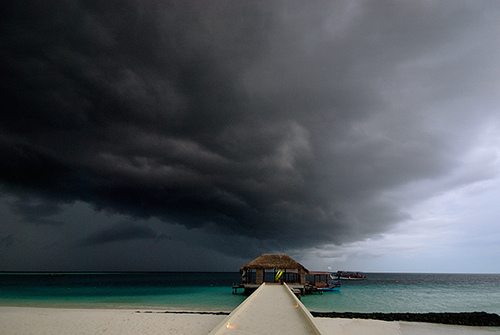
Have you ever quit writing for a period of time? Perhaps for years?
I did.
I was a teenager and had written a story I was particularly proud of. I'm not sure why, after all these years the memory is vague, but I remember being pleased.
Then I made a mistake. As it turns out, a huge mistake.
I gave it to the wrong person to read and then I asked them for feedback.
It's not just that the feedback stung. It's not just that this person's list of things wrong with that story was as long as my arm, it's not just that they clearly felt resentful that I'd wasted their time. No, it was that my own judgement had been so far off, that I'd been proud of a story that was so clearly crap.
I hope you folks see the flaw in my thinking. I'd asked one person.
Yes, sure, that person had read most of what I wrote, but I failed to ask myself whether they could have had a bad day, whether they were going through something in their private life which might have made them a tad grumpy and irrational. Which, as it happens, they were.
But let's imagine that my critiquer had been having a great day and wasn't the least grumpy and gave the same devastating critique. In retrospect, what should I have done?
Ignore it.
Here's what I think: if anyone gives you a critique so scathing that, were you to take it seriously, you'd never want to put pen to paper again then ignore the critique! Do NOT take it seriously.
Even if you gave the story to 10 people and they all thought it was fit for nothing but lining bird cages that doesn't say anything bad about you as a writer. You liked the story, that's what counts. And, sure, there's probably something about the story that's personal to you that makes you love it, but that's not a bad thing. Save the story, cherish it. That one's for you.
Now move on and write the next story. Do it NOW! Right away.
I've only ridden a horse once, so I don't know from personal experience if it's true that after being thrown you have to get right back on, but I think if a person has a horrible experience with a story they have to write another one right away. But, please, be sure to give your new story to someone who isn't having a bad day and who seems genuinely happy to give you feedback.
Also, it can help to be clear about the kind of feedback you'd like as well as what you consider constructive as opposed to destructive criticism.
As long as you're writing you're getting better. Not writing never helped anyone become a better writer.
What to do if your story is given a devastating critique
1. Talk about it
Having friends is great, having friends who are writers is a must.
Embarking on a career as a writer without having a network of writing friends and acquaintances is like going on a deep sea voyage during hurricane season without lifeboats or a personal flotation devise.
2. Write about it
I think this is a great way to turn a bad experience around. Especially if you can sell your story. Turn your horrible experience into creative non-fiction and then send the piece out or indie publish it.
You might want to write a first draft and then let some time pass--weeks or even months--before you read it again. Make sure it's not a rant. (grin) Or, if it is, make sure it's a rant that would be entertaining to others.
Making money from the experience may not be the best revenge (Joe Konrath had a few tongue-in-cheek suggestions a while back) but it's still darn satisfying.
3. Learn from it
As I mentioned, often destructive criticism has nothing to do with the merits or demerits of your story and everything to do either with an agenda the poster has (some reviewers enjoy dumping on anything they perceive as indie), or the kind of day they're having.
Since you've read the critique the damage has been done so try to determine if there's anything you can learn from what the poster said.
Were they irritated because you'd used a mirror to describe a character? Were they perturbed that you didn't tell anyone your protagonist's name until well into the story? You don't have to change something just because a reader or three was upset about it, but sometimes the information can be useful.
Sometimes it makes one feel better to know why a critiquer had the negative reaction they did. "This story is a pile of crap" isn't helpful, "This story is a pile of crap because X" helps put the review in perspective.
4. Do NOT respond
Whatever you do, don't respond to the negative critique.
I once had a crank caller who I suspect was my ex-boyfriend. This person would call at all hours of the night, wake me up, then make gibbering noises into the phone.
At first I politely asked the caller to stop. Then I shouted. Then I used a loud whistle.
Nothing worked.
Then I stopped responding in any way and just hung up the phone and disconnected it from the wall for the rest of the night while I slept.
The calls stopped.
Responding to negative reviews just wastes your time--time that could be spent writing--and it can make one look unprofessional.
5. Don't look
Don't look at your reviews.
(This point only applies to reviews on social media sites and retailers like Amazon.com.)
I know, I know, this is much easier said than done. We want to know what other folks thought of our work.
Actually, that's not true. We want to know that readers loved our books. Chances are most will but it's inevitable you'll get a bad review if you keep writing for any significant amount of time.
And you can't do anything about it. You can't respond to the reviewer (see point 4, above) so what's the point of looking?
If we write hoping for the approval of others we set readers up as our judges, which isn't how it should be. Yes, we want to share our stories with others--that's a big part of why I write--but I write primarily for myself.
If I think I've written a great story, if I had fun writing it, that's all I can ask. Of course I give it to my first reader, and I usually do another draft after that in response to their feedback (they seem to always catch something I missed) but, fundamentally, I write for myself.
6. Eat Chocolate
Chocolate is good. (grin)
Question: How do you get over a destructive critique?
Other articles you might like:
- Writer Beware: Penguin And Author Solutions- Creating The Perfect Murderer
- How To Design A Great Looking Book Cover
Photo credit: "Galapagos Sea Lion's Baby Portrait" by A.Davey under Creative Commons Attribution 2.0.










